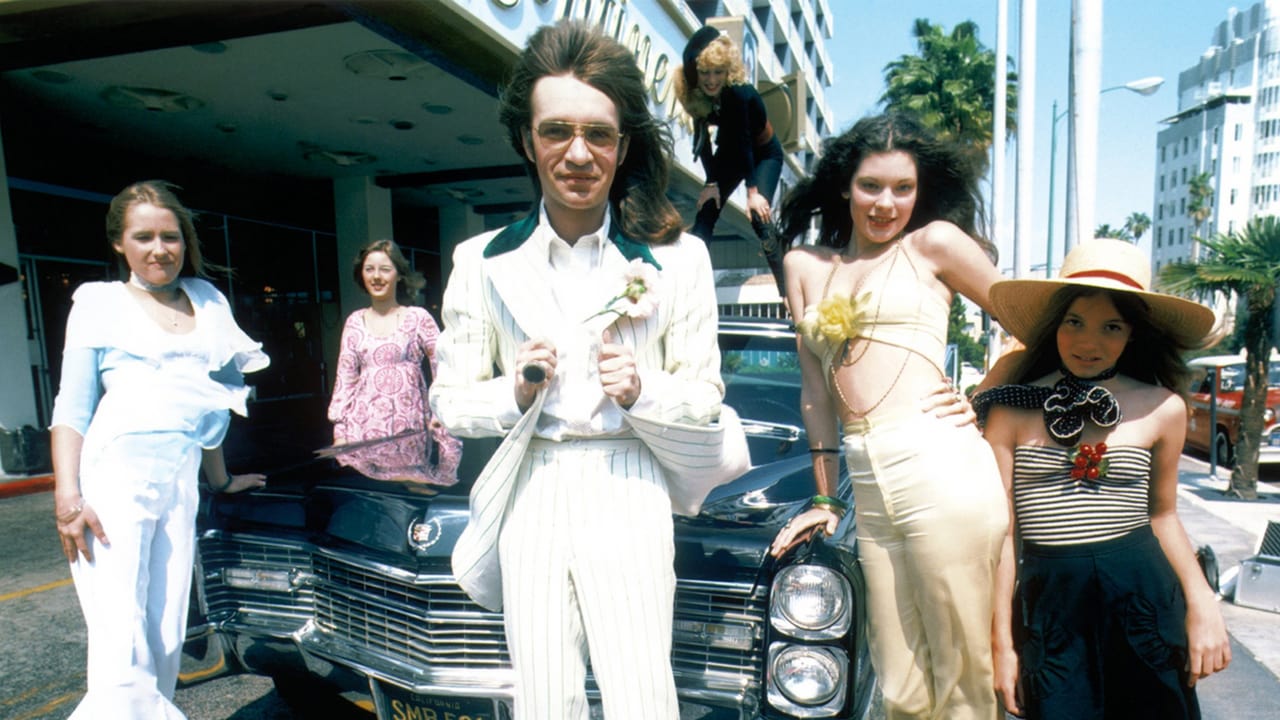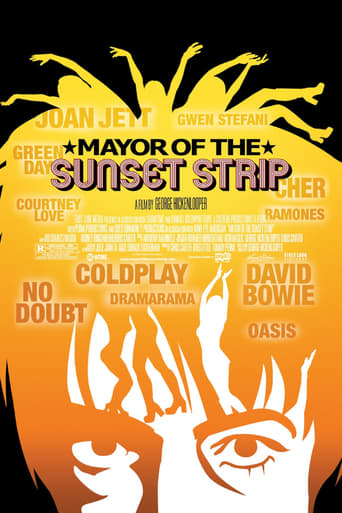


Slow pace in the most part of the movie.
... View MoreI like movies that are aware of what they are selling... without [any] greater aspirations than to make people laugh and that's it.
... View MoreIt's not great by any means, but it's a pretty good movie that didn't leave me filled with regret for investing time in it.
... View MoreAmazing worth wacthing. So good. Biased but well made with many good points.
... View MoreTHE MAYOR OF SUNSET STREET (dir.George Hickenlooper) provides a provocative and in depth analysis of Rodney Bingenheimer, one of the most influential pop-music media figures of the last 40 years, yet for all of his power and influence, the man seems lonely, adrift, and somewhat shattered. Hickenlooper overwhelmingly makes the case that Rodney was at the very epicenter of what was 'hip' for many decades. However, by the end of the film, one wonders how such close access to wealth, celebrity, and mass adulation would gain Rodney so very little. It is both sad and ironic that a man who's impeccable taste brought joy to millions of music fans would end up in such a melancholy situation. THE MAYOR OF SUNSET STREET is a strikingly original portrait of a rather doleful individual.
... View MoreCuriously (and yet thoughtfully) detached portrait of longtime KROQ disc jockey Rodney Bingenheimer, a California kid of the suburbs in the 1950s--a child of divorce by the age of three and a target for all the bullies on the block--who discovered the heavenly haven which was Los Angeles in the 1960s and insinuated himself into celebrity circles. Doubling for Davy Jones on an episode of TV's "The Monkees", Bingenheimer's Hollywood cache steadily grew until he was practically discovering all the latest and greatest talents to hit Tinsel Town. This visually and aurally dynamic documentary from writer-director George Hickenlooper exists in a quirky sort of vacuum, focusing totally and completely on Rodney's celebrity conquests while ignoring the tumult which was California in the politically strife-ridden 1960s. Bingenheimer returns to the spot where he had once opened a celebrated discotheque in the '70s, attended by the glitterati of show business, before disco music itself killed off the glitter and glam; still employed by radio station KROQ, Rodney (rather listlessly) goes with the flow of the program managers, not relevant to the times but still commanding respect with classic artists. It's a surprisingly downbeat personal portrait of a man who has spent his entire adult life surrounded by legends (many of whom are interviewed), yet who has very few close friends. The film doesn't have the expected snarl and bite, except for one scary moment when Bingenheimer believes friend and fledgling DJ Chris Carter has just stabbed him in the back (Rodney suddenly comes out of his celebrity-induced stupor and yells at the camera, "F**k you!"). Instead, "Mayor" is mostly a ghostly sojourn to past glories, with all hallowed roads leading backward turning up as bittersweet dead-ends. *** from ****
... View MoreI had never heard of Rodney Bingenheimer prior to catching the doc on Showtime, so it was somewhat shocking to see how involved he was in the musical lives of many bands that I like. He, as has been said elsewhere, is like a musical Zelig; in one funny sequence, he is seen in the videos of the Mamas & Papas, Blondie, The Ramones (I think) and many more--one of the those nameless people in the background clapping their hands, singing along, etc.His acceptance by the famous as a male groupie is due to his nearly blank canvas of a personality--he seems to have no real emotional depth. His wallpaper-like persona is similar to Andy Warhol's except that Warhol's was very likely an act--there was a lot going on under that wig. That can't be said for Rodney. He has nothing much to say about anything other than "wow" or "really?" or "that's great." What he does have is good intentions and a lack of an exploitation gene so that celebrities feel safe around him.Interestingly, he has a Doppelganger in producer/artist Kim Fowley with whom he appears to be very close. Fowley is everything Bingenheimer is not: crass, manipulative, exploitative, even violent. It is an interesting psychological study. A second shadow figure is presented in an aspiring recording artist/sad sack that Bingenheimer befriends: these two friends carry some of the things that Bingenheimer cannot allow for himself.The film goes from a story of a guy gliding happily through life to a kind of sad story. When asked how he'd like the film to end, an obvious metaphor for his own life, Bingenheimer tellingly responds "I just want everyone to be happy, to enjoy the film." He cannot aspire to his own happiness, cannot make any real claims life. Ultimately, the famous who have made real lives for themselves, move on. Rodney, like Melvilles's Bartlby, cannot.
... View MoreAs an Angeleno, I was a long-time listener to KROQ, but gave it up the day grunge came to town. I used to listen to Rodney back when he was on at a decent hour. He was so weird and you always felt like you were terribly cool and on-the-edge for listening to him. It is too bad KROQ abandoned Rodney's kind of music in favor of the crap they play today.But on to the movie itself. I thought it was excellent in its own right, which had the classic tragedy theme. Looking at it that way, this movie could not have been better.But from a music standpoint there was something lacking. Rodney is Rodney because of the music, his love of the music, his ear and knack for the music. There was plenty in this movie about the musicians but very little about the music they play. I would have liked a few comments along the lines of, "Oh, the first time I heard the opening riff of such-and-such a song," or "Man, when I saw so-and-so play for the first time at the Whiskey!" There is a curious lack of talk about the actual tunes in this movie. One DOES come away with the feeling that it was just celebrities that Rodney loved and not the art they created...and I know this is not the case.But back to the "tragedy" that was this movie's real purpose. It was so excruciating to watch some of these scenes. A truly great movie in this respect. The encounters with the family, the dumping of his mom's ashes, the freak-out with Chris Carter, the horrible, horrible side-story of the 50-year-old wannabe rock star. This movie was positively Shakespearean! And knowing what a tragic landscape Los Angeles really is, I loved that this was conveyed so well in this film; the Denny's, the stripmalls, the ugly apartment buildings.
... View More